How are parents with toddlers running dangerously high fevers managing to stay sane at a time when Omicron is filling up scant beds in children’s hospital ICUs?
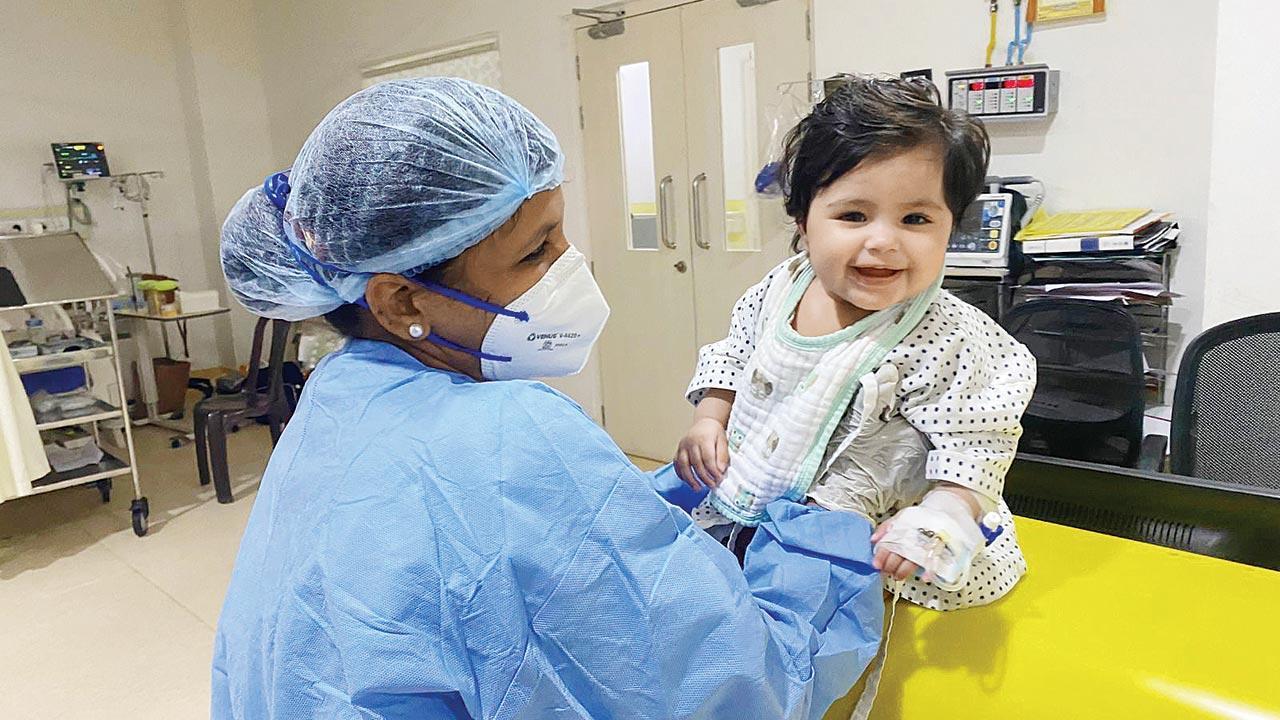
Tara (seen here with hospital staff), says her mother Pratha Narang, was running a 103 fever and was admitted to SRCC. In a few days, the Worli hospital was contemplating setting up a second ICU to tackle the caseload. Pic/Pratha Narang
Photographer Pratha Narang and her husband Sushant Naik, who works with Amazon Prime, had a nasty end of year surprise waiting for them. On December 28, their six-month-old daughter Tara developed a fever that shot to 103.5. Her paediatric doctor suggested she take paracetamol. The fever didn’t go, and was now accompanied by a nasty rash. Tara was prescribed Ibugesic, a combination of Ibuprofen and paracetamol. The fever climbed down only to shoot up in four hours. “It was the beginning of a nightmare,” says Narang, who was soon at Worli’s SRCC Children’s Hospital, one of the few in Mumbai admitting kids with COVID-19. “The RT-PCR test hadn’t been done yet, so we admitted her to the suspect ward. We took her home in a few hours, and that was a big mistake.” At home, Tara took a nap at 10.30 am and didn’t wake up till four in the evening. “She was struggling to open her eyes. She had high fever and her oxygen levels
had dropped. We went back to the hospital, and were there for five days. Her test came positive, and by this time, I too had tested positive for COVID-19, as had my husband and mother.”
ADVERTISEMENT
That day, mother and daughter were the only occupants at the ICU, but by the time they left, there were 13 other children. “I was there when the doctor was telling the head nurse that he didn’t care how it would happen, but he needed an additional ICU set up right away. I was told to assume Tara had contracted the Omicron variant, considering how it was spreading swiftly. We are lucky we are back and healthy home.” Narang remembers an eight-month-old who was badly off, and she says she hopes she made it out. Another 10-year-old was having trouble breathing and each time she inhaled, she made a whistling sound. Narang has decided not to step out because the paediatrician has warned that the infection could return.
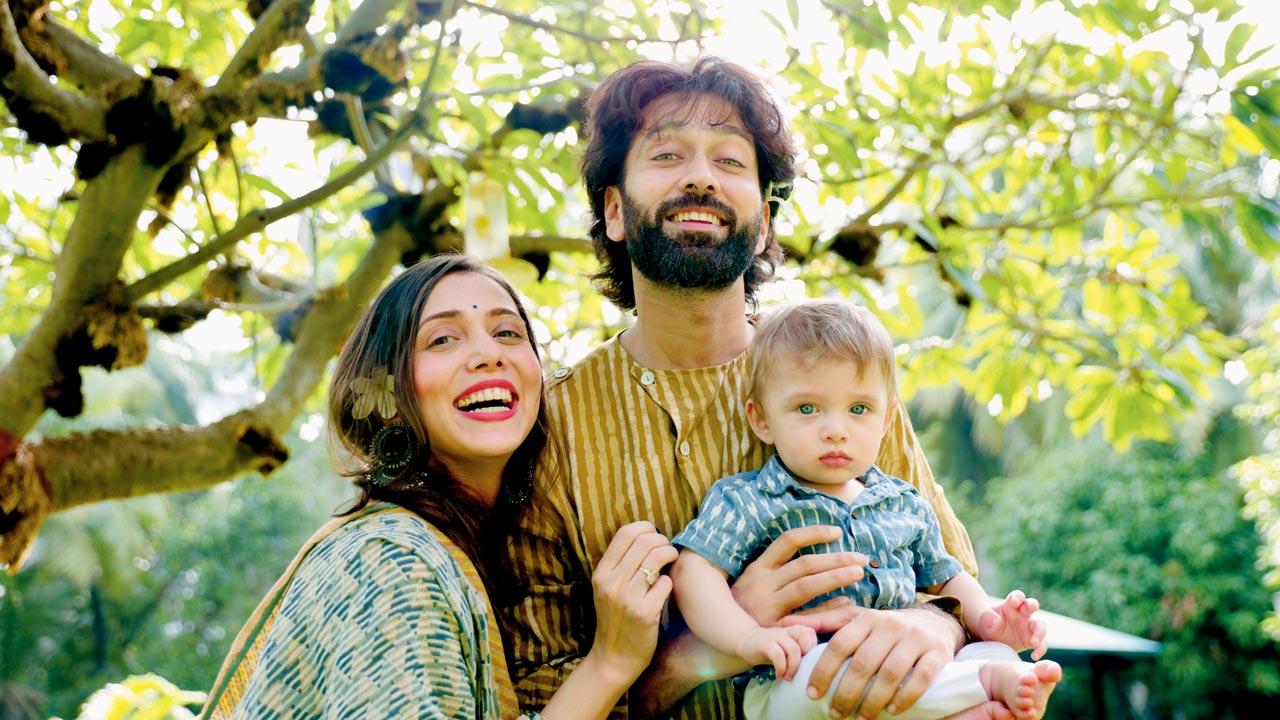 Nakuul and Jankee Mehta’s 11-month-old son Sufi was rushed to the hospital with 104 degree fever. Nakuul feels that the only way to keep your kids safe is by monitoring them
Nakuul and Jankee Mehta’s 11-month-old son Sufi was rushed to the hospital with 104 degree fever. Nakuul feels that the only way to keep your kids safe is by monitoring them
The BMC and State Task Force admitted last week that the third wave of the Coronavirus pandemic was officially here. According to experts, 85 per cent of all COVID cases can be attributed to Omicron, a new variant of the SARS CoV-2 virus that was first identified in South Africa on November 24.
While it’s engulfing adults with speeds faster than the earlier Delta variant—new daily cases in Mumbai stood at 20,971 last Friday—it seems that children under five and especially those younger than one year, are being affected with severity.
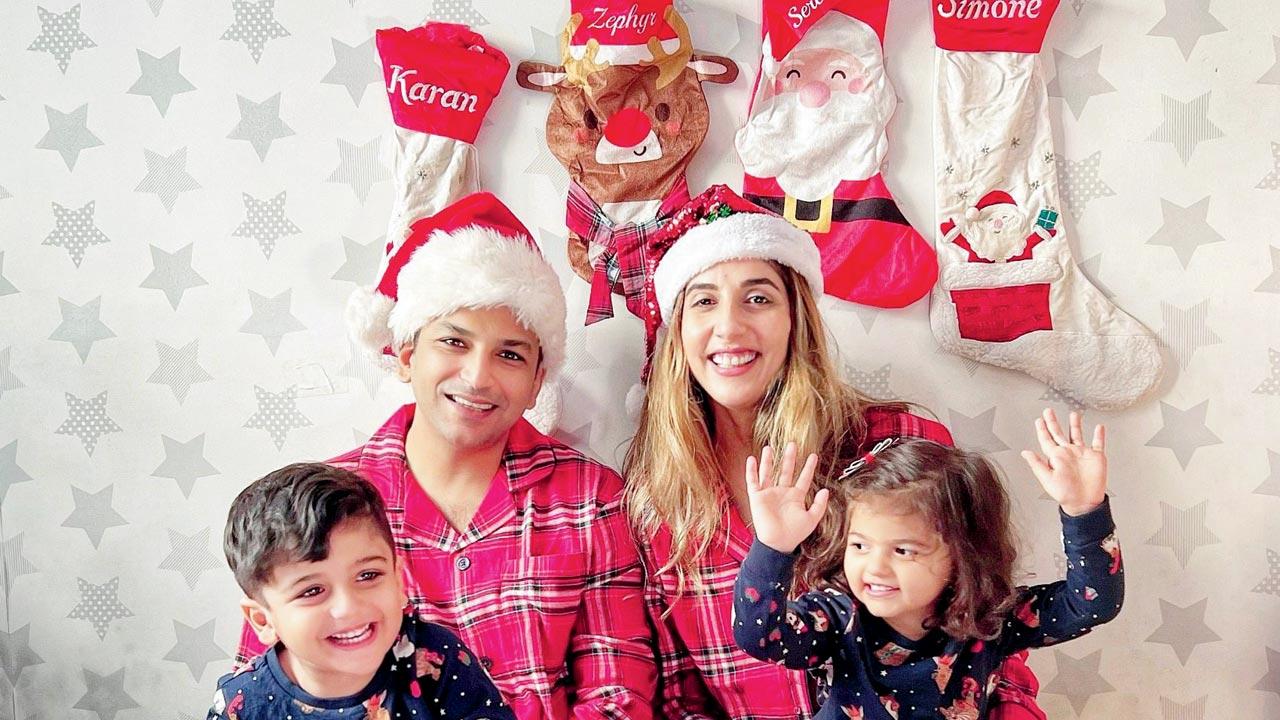 Parent and content creator Simone Khambatta believes that keeping kids inside will only decrease their immunity. She has been at the forefront of the parent movement to keep schools open
Parent and content creator Simone Khambatta believes that keeping kids inside will only decrease their immunity. She has been at the forefront of the parent movement to keep schools open
In South Africa, Wassila Jassat, public health specialist at the National Institute for Communicable Diseases (NICD), was quoted as saying: “A new trend in this wave is the increase in hospitalisation of children under five.” In the US, according to the American Academy of Pediatrics, almost 1,99,000 children were reported infected with COVID-19 in the week ending December 23. The only other age group where hospitalisations have hit a new peak are 18-29 year olds.
Early research coming out of Hong Kong basis lab testing of tissue samples has shown that Omicron replicates up to 70 times faster in the bronchi or the airways leading into the lungs, compared to Delta. It’s this that explains its extreme spread throughout the population, including children.
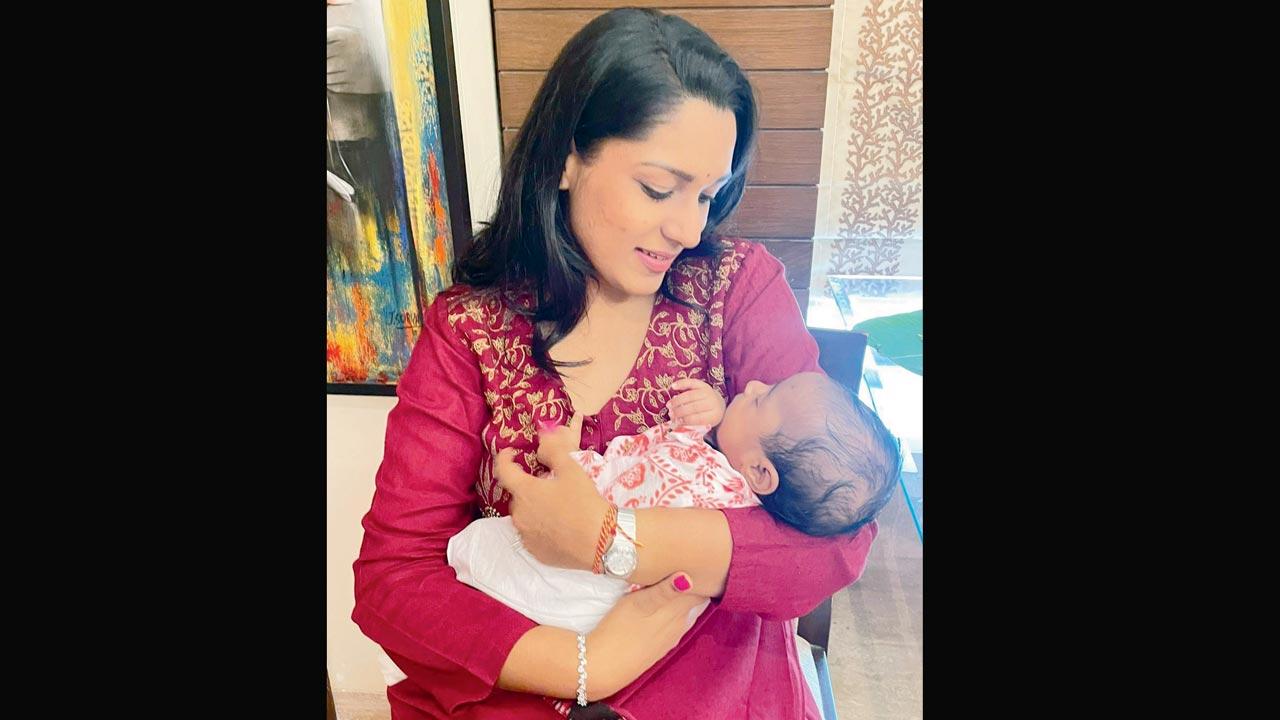 Dr Adukia’s three-month-old daughter Aardhaya got COVID-19, and had developed symptoms like irritation and comfort feeding before the onset of the virus
Dr Adukia’s three-month-old daughter Aardhaya got COVID-19, and had developed symptoms like irritation and comfort feeding before the onset of the virus
Dr Subhash Salunke, state advisor on COVID-19 and former director general of health services (Maharashtra), says, it’s not that this variant is selectively targeting children. Because it is so transmissible, children end up getting swept in the storm along with adults, he believes. “Yes, they are vulnerable. Kids with comorbidities and lower resistance are getting influenza and flu-like symptoms, which is anyway natural in children. The fact remains that children will get infected and the numbers will increase, but there’s no cause for alarm.” What’s critical though, is deciding which child needs to be hospitalised and who can do with home-based care. “Unnecessarily rushing of children to the hospital is not a good idea because they might get exposed to more infections. The decision of shifting a kid to hospital care needs to be taken at the right time, neither prematurely nor too late. And that’s where the role of primary healthcare professionals, both private and public, becomes important in guiding parents.” He says hospitals in Mumbai are already gearing up for a larger outbreak in children. “Mumbai’s infrastructure is better equipped to deal with this scenario than any other city in the country,” he thinks.
Meanwhile, in the West there have been reports about children developing ‘croup’, a harsh, barking cough triggered by swelling in the airways and trouble with breathing. According to Johns Hopkins Medicine, croup is spread through direct contact with a person, or fluids from another person who has the disease. The infection starts in the nose and throat and moves into the lungs. Swelling affects the area around the voice box (larynx) and into the windpipe (trachea). Younger children, from three months to five years, are more affected by croup because their airways are smaller. In fact, this week, Toronto’s Hospital for Sick Children and McMaster Children’s Hospital issued a statement urging pregnant women to get vaccinated against COVID-19, citing a recent trend of infant hospitalisations due to the infection. “With the rise of Omicron, hospitals are starting to see a disturbing, potential new trend—admissions of infants with COVID-19,” it read. The group said six babies younger than 12 months had been admitted to the Hamilton and Ottawa facilities since the middle of December.
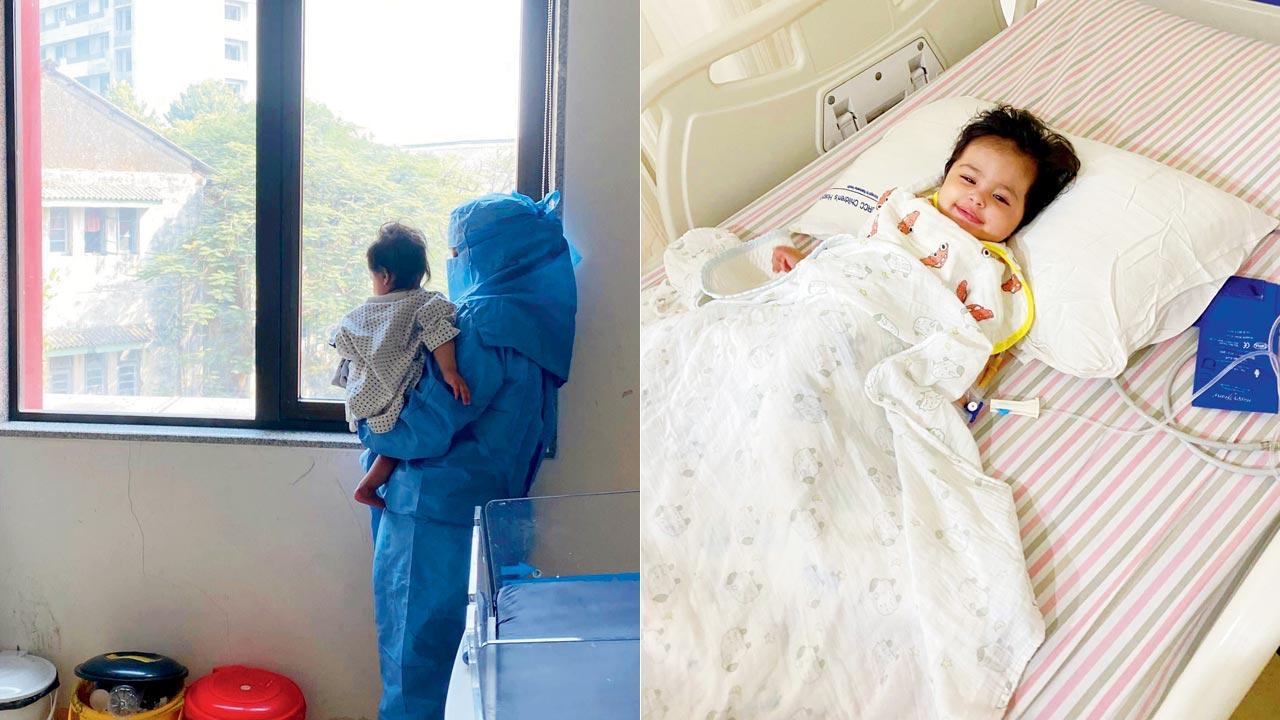 Tara and her mother Pratha Narang spent the day that she turned six months old in the ICU of the SRCC Children’s Hospital in Worli. This was on January 1. She says that by the time they left, the ward was full of sick kids, some of them facing acute breathing difficulties
Tara and her mother Pratha Narang spent the day that she turned six months old in the ICU of the SRCC Children’s Hospital in Worli. This was on January 1. She says that by the time they left, the ward was full of sick kids, some of them facing acute breathing difficulties
The anxiety among parents, particularly those with kids who can’t yet get a COVID-19 vaccine, is understandable, say doctors. Like Narang, Nakuul Mehta and Jankee Parekh Mehta call their time in hospital with their 11-month-old son Sufi, a nightmare.
After the actor and his singer and influencer wife tested positive last month, Sufi also developed a fever that spiralled past 104 degrees F, and broke after three days of ICU care. “All we could do was regularly monitor his temperature. We can’t mask such young kids and vaccination isn’t yet available for them,” says Mehta. Sufi managed to bounce back and Mehta feels that it’s best if kids remain indoors in the current circumstances.
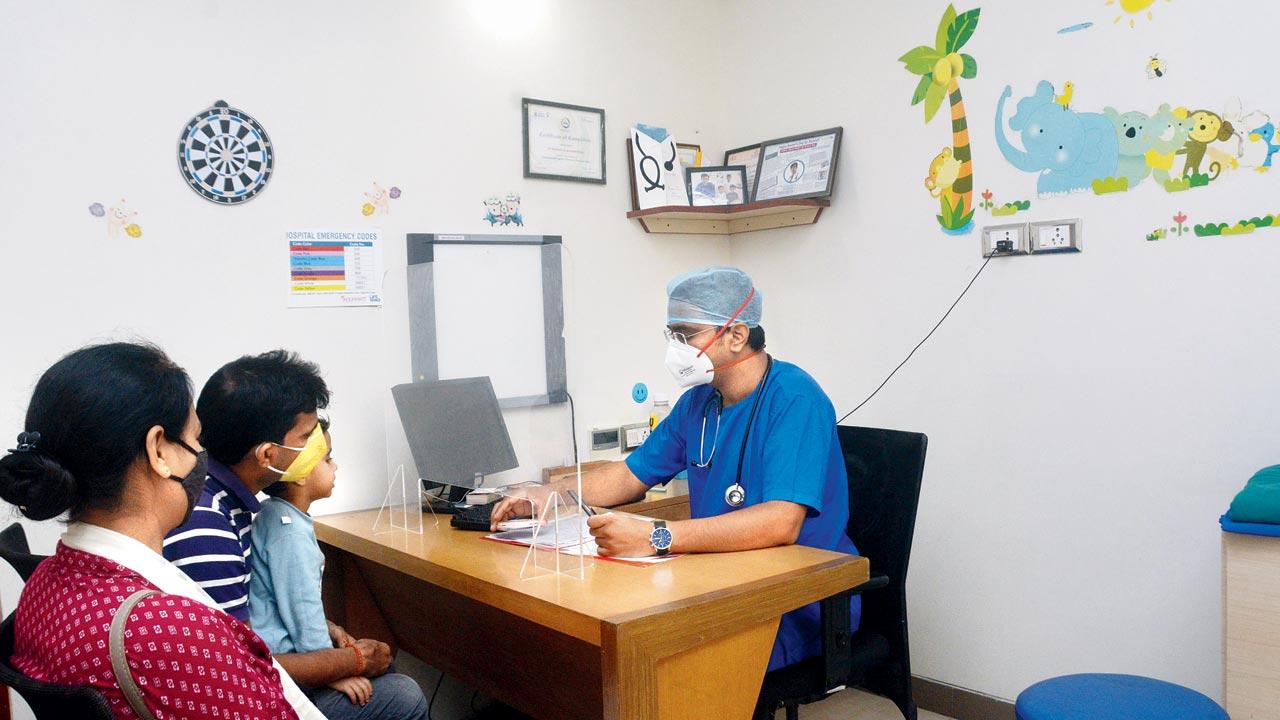 Dr Ankit Gupta says cases in kids bound to go up. Pic/Satej Shinde
Dr Ankit Gupta says cases in kids bound to go up. Pic/Satej Shinde
“Only really brave parents I think can think of sending their children to school right now. We have waited two years, we can wait a few more months.”
Infants have been considered part of the high-risk category since the Coronavirus outbreak, says Dr Ankit Gupta, Paediatric Critical Care Specialist at Wockhardt Hospital, Mira Road. “While infectivity and transmissibility of Omicron are high, mortality remains under control. Adults are the ones transmitting the infection to children, and so, as infections in adults increase, they are bound to among children too.” Until now, Wockhardt has seen hospitalisation only in cases where children have comorbidities like renal failure, asthma, heart issues or chronic lung disease.
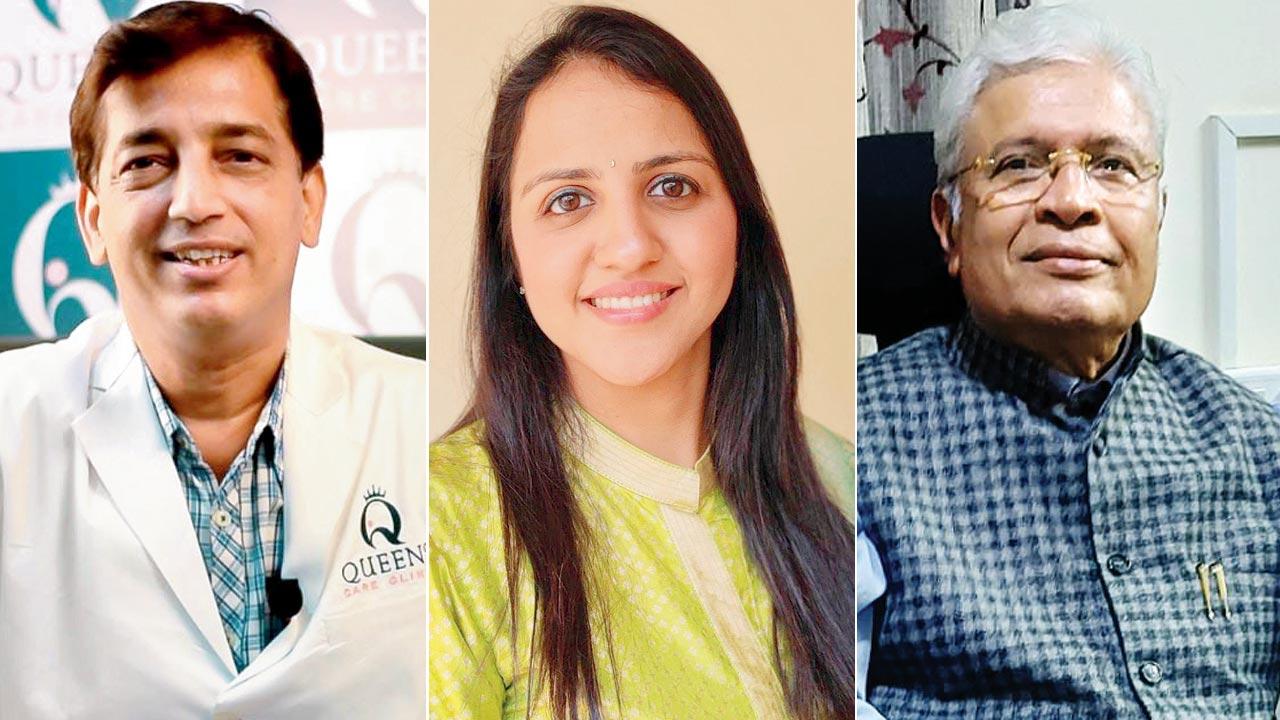 Dr Talib Surve, Dr Trupti Gilada and Dr Subhash Salunke
Dr Talib Surve, Dr Trupti Gilada and Dr Subhash Salunke
Dr Trupti Gilada, infectious disease specialist at Byculla’s Masina Hospital, says they are seeing more symptomatic cases in children. There could be two reasons for this, she thinks. “One, during the Delta wave, adults and children were both unvaccinated, but now the former group is inoculated, leaving the other one vulnerable. It could also be the biological property of Omicron itself; most of the infections are still mild. We aren’t seeing severity. The one worrying thing that is unfolding at least in Mumbai is that paediatric wards of private hospitals are seeing a shortage of beds. This morning, I had a case of an eight-month-old COVID positive child who needed admission due to underlying respiratory disease and the parents couldn’t find a bed easily. The government might say that there are a lot of beds available in public hospitals. But we know there’s a clear divide between who accesses private healthcare and not. We don’t want to get to a point of desperation like we did in the second wave. I think preparing intensive care beds for the paediatric setup should be prioritised here on.”
According to Dr Talib Surve, Paediatric Consultant at Queenscare Hospital, Thane, although the symptoms of Omicron are milder, they have seen serious post-COVID complications occurring in children, including cardiac involvement and multisystem inflammatory syndrome in children (MIS-C), a condition where different body parts can become inflamed, including the heart, lungs, kidneys. This can be life threatening. While the usual symptoms related to Omicron include an upper respiratory tract infection like fever, runny nose, throat pain, body ache and dry cough, he suggests that parents watch for fast breathing, difficulty in breathing, chest indrawing, dehydration, pain in the chest and lethargy. Urgent medical attention is required for any such symptoms. Dr Gilada says nausea and loose motions are new symptoms that have emerged. Presently, treatment includes oxygen, intravenous fluids, supportive treatment and screening for complications.
Content creator and mommy blogger, Simone Khambatta, who has kids aged two and four, has been a vocal supporter of the send kids back to school campaign. About the state government’s decision to close schools again last month, she says, “The numbers are three times higher in New York, but schools are open. The cases that you have spoken about as well—of Tara and Sufi—are of kids below one year. If we can take our kids to Christmas parties and have them attend activity classes, then going to school is also fine. All teachers are vaccinated, and the schools are properly sanitised. Rumour mongering among people and some elements of the media is rampant. This is our life now, and we can’t keep shutting down schools. Even before COVID, my doctor had told me kids can get as many 15 cold attacks a year. If we keep them inside, their immunity will be compromised more,” Khambatta argues. She continues to worry about the mental toll keeping kids inside their homes is taking on them. “My son can’t socialise anymore. I took him to Dubai for a trip and when he met other kids, he didn’t know how to react around them.”
Pregnancy specialist Dr Vanshika Gupta Adukia, 29, agrees with Khambatta. Let parents have the option to send their kids to school or not. “The more you keep them indoors, the more their immunity will get impacted. But, I agree that all children are at risk now [of contracting the virus].” Adukia and her three-month-old daughter Aaradhya, have been down with COVID and have been asked to assume that it’s Omicron. “Along with fighting the fever, she was also very irritable.
Her bowel movements have also changed. This can perhaps be attributed to COVID.” Adukiya feels that in the absence of a vaccine, what parents can do right now is keep their own immunity and that of the children up. “Work out, keep moving. And try home remedies like having ginger and honey paste. Keep yourself health so that if you happen to get it [COVID], you can fight it.”
19.9 lakh
No. of kids reported infected in week ending Dec 23, 2021 in US, according to the American Academy of Paediatrics
70
No. of times faster that Omicron spreads in the bronchi or the airways leading into the lungs compared to Delta, according to a Hong Kong-based research
1,500
Approx number of beds available for children affected by COVID-19 in the public sector in Mumbai
How to protect unvaccinated children
. Make sure every eligible family member is double vaccinated.
. Keep the mask on for kids over the age of two practising social distancing, and limiting the size of social gatherings around them.
. Make sure your child is put to speed on other immunisations like the flu shot.
. Try and keep the children home and call a doctor if they get sick, or you suspect they could’ve been exposed to someone who tested positive.
Symptoms to watch out for
High fever
Difficulty breathing or fast breathing
Chest indrawing
Dehydration
Pain in
the chest
Lethargy or listlessness
Rash
Loose motions and nausea
 Subscribe today by clicking the link and stay updated with the latest news!" Click here!
Subscribe today by clicking the link and stay updated with the latest news!" Click here!








